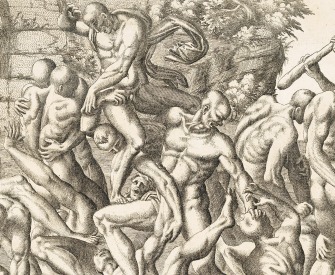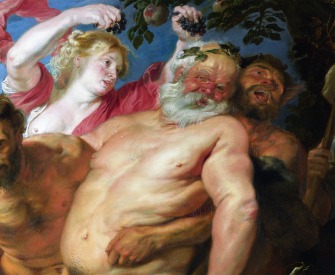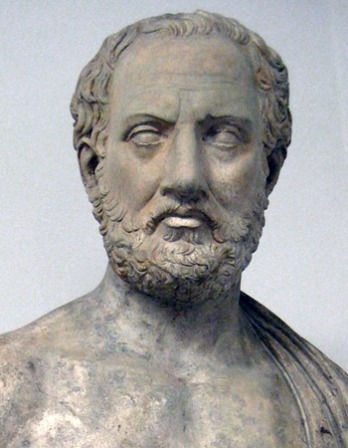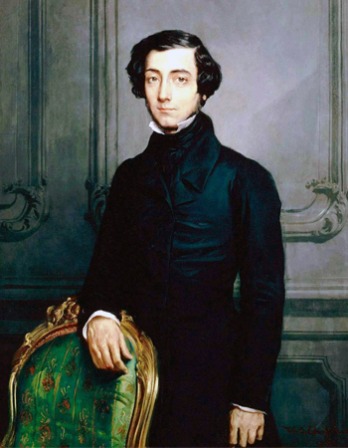Globalization
Following the money across the globe and back in time.
By Lewis H. Lapham

A Goldsmith in His Shop, by Petrus Christus, 1449. The Metropolitan Museum of Art, Robert Lehman Collection, 1975.
Time itself has got to wait on the greatest country in the whole of God’s universe. We shall be giving the word for everything: industry, trade, law, journalism, art, politics, and religion, from Cape Horn clear over to Smith’s Sound, and beyond, too, if anything worth taking hold of turns up at the North Pole…We shall run the world’s business, whether the world likes it or not.
—Joseph Conrad
In the era of imperialism, businessmen became politicians and were acclaimed as statesmen, while statesmen were taken seriously only if they talked the language of successful businessmen.
—Hannah Arendt
Time itself didn’t have long to wait for the ascendance of American commercial empire. Conrad in his 1904 novel, Nostromo, assigns the voice of economic dominance to the San Francisco banker Holroyd, “his massive profile” that “of a Caesar’s head on an old Roman coin,” buying control of an imaginatively constituted South American republic. Fifteen years later the voice is President Woodrow Wilson’s, in Paris at the end of World War I giving the word for everything (free trade, national self-determination, peace without victory) to the bankrupted thrones and dominions of bourgeois Europe.
Fare forward another thirty years to the end of World War II, and it is the voice of the American diplomat George Kennan, circulating in 1948 as a State Department memorandum phrased in the language of the successful businessman: “We have about 50 percent of the world’s wealth, but only 6.3 percent of its population…Our real task in the coming period is to devise a pattern of relationships which will permit us to maintain this position of disparity…To do so, we will have to dispense with all sentimentality and daydreaming,” disregard “unreal objectives such as human rights, the raising of the living standards, and democratization.”
The American word for everything held its value for nearly the whole of the twentieth century, but time is no more inclined to stay than wait. The first 2019 issue of Foreign Affairs, voice of America’s material interests and moneyed elites, asks on its cover, who will run the world? and follows up the question with a collection of articles and essays—“How a World Order Ends,” “The Eroding Balance of Terror,” “The Age of Uneasy Peace,” “The Free-Trade Paradox,” “America’s Long Goodbye”—explaining why America is no longer up to the task.
Not, God forbid, through any fault of America’s own. But because globalization is dehumanization, and the rule of money is the rule of nobody. The great, good, and glorious machine that generates the world’s wealth and directs the world’s trade (aka “creatively destructive capitalism,” “the unfettered free market”) doesn’t come equipped with the freedoms of human thought, conscience, or speech. Admittedly, a design flaw, but not one that troubles the upper servants of American oligarchy. They enjoy first-class accommodations on the bridge deck of Leviathan and make no complaint of its brutality—name of the game, nature of the beast. What disturbs them is the insult to their vanity. The bewildered policy-speak in the winter issue of Foreign Affairs is the voice of merchants who would be kings reduced in function to engine-room sweat labor heaving steel mills and shopping malls, movie studios and migrants, into a remorseless furnace.

Factory-worker housing being erected, Tijuana, Mexico, 1995. Photograph by Alex Webb. © Alex Webb, courtesy the artist and Robert Klein Gallery.
The dehumanization of the world’s trade is a refinement relatively new under the sun, and the reader curious to know how things worked before the nineteenth-century coming of the steam engine can find Joseph Addison in 1711 on the floor of the Royal Exchange in the midst of “a prosperous and happy multitude” of Danes, Russians, Frenchmen, Swedes, Persians, Englishmen, and Egyptians “thriving in their own private fortunes and at the same time promoting the public stock…bringing into their country whatever is wanting and carrying out of it whatever is superfluous.” Addison is an early prototype of the tabloid gossip columnist trafficking in the lives of the rich and famous, and his heart “naturally overflows with pleasure” at the silk-smooth sight and sound of the most “useful members in a commonwealth,” who “knit mankind together in a mutual intercourse of good offices, distribute the gifts of nature, find work for the poor, and wealth to the rich, and magnificence to the great.”
Addison exaggerates the benevolence of merchants and overlooks mankind’s long history of economic warfare (cf. Paul Strohm’s essay “Maken Engelond Gret Ayeyn”), but in 1711 he can still see a global economy run by and for human beings. Moneymaking is not yet the primary objective of the journeys to the East and the sailings to the West. The worth of a thing still matters as much or more as the price of a thing. The traders on the eighteenth-century floor of the Change accepted the truth told by Aristotle around 330 bc: that of everything we possess there is a primary and secondary use, the one “needed for the satisfaction of men’s natural wants,” the other for something intrinsically useful (“iron, silver, and the like”) to serve as surrogate for “the necessaries of life” (grain, cattle, wine) “not easily carried about,” i.e., a form of barter “not part of the moneymaking art” and therefore not contrary to nature. What is contrary to nature is the assigning to money a value it doesn’t possess, the conceiving of wealth solely and stupidly as “a quantity of coin.” Aristotle reduces the notion to absurdity:
But how can that be wealth of which a man may have a great abundance and yet perish with hunger, like Midas in the fable, whose insatiable prayer turned everything that was set before him into gold?
The Scottish moral philosopher Adam Smith poses the same question in 1776, attributing The Wealth of Nations not to the power of money but to “the propensity in human nature…to truck, barter, and exchange one thing for another.” In civilized society men at all times need the cooperation and assistance of their fellow men. Money doesn’t go it alone. The trucking disposition (“Give me that which I want, and ye shall have this which you want”) gives occasion to the division of labor, which in turn encourages every man to “bring to perfection whatever talent or genius he may possess for that particular species of business” and thus provide surplus products of his own labor (goods over and above his own consumption) to exchange for surplus goods produced by other men. Like Addison and Aristotle, Smith thought the trucking disposition “common to all men, and to be found in no other race of animals…Nobody ever saw a dog make a fair and deliberate exchange of one bone for another with another dog.”
Smith didn’t live to see the trucking disposition transferred to the race of machines. The devaluation of human labor becomes the trademark of the nineteenth-century industrial revolution. The rapid development of machine-made production accompanied by the equally rapid expansion of the world’s markets and credit allows Karl Marx and Friedrich Engels in 1848 to see a perfect storm of creative capitalist destruction blowing at all points of the geo-economic compass with the “single unconscionable freedom—free trade,” a means of exchange that substitutes “callous ‘cash payment’ ” for every other form of human meaning and endeavor, devotes itself to “naked, shameless, direct, brutal exploitation.”
The observation in The Communist Manifesto doesn’t hold true for human beings living together in societies civil and uncivil. The annual world output of man’s humanity to man is many thousands of times greater than all the tea and avarice in China—the point clearly made by Robert Kennedy at the University of Kansas in 1968—but the naked and shameless building of late nineteenth-century colonial empires rises on the Marxist blueprint of a global economy made to the specifications of money with the cooperation and assistance of machines.
What Marx and Engels frame as remorseless abstraction, the Polish novelist Joseph Conrad (born 1857, died 1924) sees as the story of his life. Leaving Poland in 1874 at age sixteen, he takes up the career of merchant seaman, and for the next twenty years aboard sailing ships and steamships he wanders a world being transformed by the capitalist dynamic armed with always more powerful weapons of technological advance—railroads, electricity, the automobile, the airplane, movies, radio, the telephone, the department store. Having learned English as his third language (French was the second) Conrad comes ashore in England in 1894 to set up as an author and take note of what he has seen on his travels in the Indian Ocean and the South China Sea, as temporary captain of a Belgian steamboat trading guns for ivory on the Congo River.
Conrad draws his portrait of the capitalist dynamic from life; my own sense of it I gleaned from reading Conrad. His books were everywhere in the house in which I grew up in San Francisco in the 1930s and 1940s, in a family that owned the American-Hawaiian Steamship Company, operating thirty-two freighters in the intracoastal trade, on- and off-loading dry cargo in the major ports on the routes between Seattle through the Panama Canal to Portland, Maine, then back the other way on reversed compass bearings. Lewis H. Lapham, the great-grandfather for whom I’m named, founded the company in 1899 in partnership with his brother-in-law George Dearborn, not because of the money in the business but because of the romance. The Dearborn ancestors were ship captains sailing for China in the 1820s out of Salem and Newburyport, one of them lost with all hands in the Strait of Malacca, two others gone down in a storm due east of Cape Hatteras with a cargo of spices, porcelain, and silk.
My father liked to tell the stories—also when I was a child to bring me to see the family’s ships at their piers south of the Ferry Building, sometimes to hear a late-arriving captain explain why and how the voyage had proved a good deal more eventful than expected. At the end of the day in my father’s library, I looked to Conrad’s novels to extend the voyage to places “beyond the end of telegraph cables and mail-boat lines,” places where “the haggard utilitarian lies of our civilization wither and die.”
My early readings of the novels missed the irony. Enchanted by the beauty of Conrad’s prose, I thought he was in the business of writing romance. I was twenty-five and reading
Nostromo for the second time before I perceived the reversed meanings of civilization and savagery, recognized in the character of the San Francisco banker Holroyd the voice and disposition of my godfather Torkild “Cap” Rieber, chairman of the Texas Oil Company that in the 1930s was supplying aviation fuel to the Nazi Condor Legion bombing castles in Spain.
My connection to the captain followed from his having commanded the first tanker owned by Texaco, a company of which great-grandfather Lapham was also a founding partner. The tanker sailed out of Port Arthur, Texas, in 1905, and over the course of the next thirty years, Rieber proved himself so adept at running the world’s business (by land as well as by sea) that in 1935, the year of my birth, he was the CEO giving the word for everything in what Time magazine admiringly likened to the “hardheaded, steel-willed” voice of a “triple expansion engine.”
Although I met Rieber once or twice in the 1940s and 1950s, I didn’t come to know him until the winter of 1960, traveling with him to Hamburg, Germany, for the launching of a tanker of which he was part owner. No longer chairman of Texaco, Rieber at the age of seventy-eight walked with the vigorous, rolling gait of a ship captain (barrel-chested, round-faced, amiable grin, bright blue eyes, fierce shock of white hair), who still boasted of holding active master-mariner’s licenses to command any ship (sail or steam) of any tonnage on any ocean.
For the launching ceremony, Rieber brought with him his daughter and two other merchant adventurers and their wives, all of us staying for three days in the Vier Jahreszeiten Hotel, Rieber every night giving a formal-dress dinner (tuxedo for the gentlemen, long gown for the ladies) at which we were joined by the owners of the shipyard—the same shipyard under the same owners that in 1939 built the tanker Skandinavia for the Texas Oil Company.
Everybody spoke English, old friends talking old times, fondly remembering how Cap managed to get Skandinavia back to the American side of the Atlantic after the outbreak of World War II in September 1939. The admirals in Berlin wanted to retain the tanker in German custody for fear of its use in the convoys supplying Great Britain. Cap stayed a long weekend at Carinhall, Hermann Göring’s Gothic hunting lodge in the Schorfheide, dining on wild boar, listening to the music of Richard Wagner, petting the pet lion, admiring the swans. The soon-to-be Reichsmarschall granted exit visas for the tankers in return for continuing shipments of fuel to the Nazi war effort in 1940.
The history lesson spread for three nights across a table always festive with wildflowers, oysters, and champagne, and over the many courses of gemütlichkeit, money was invariably the hero of the tale. Governments come and go, and so do wars and ideologies; money lives forever. The shipyard owners made no apologies for Hitler, nor did the captain regret his dealings with Göring and Francisco Franco, the Spanish dictator who made Rieber a Knight Grand Cross of Isabella the Catholic. For a good many American corporations in the 1930s, dealing with Nazi Germany was standard operating procedure; Ford and General Motors building trucks for the Wehrmacht, the Rockefeller Foundation funding Nazi eugenics programs. The oil tanker sliding the next day into the Elbe River was a multinational corporate enterprise, free and clear of romantic sentiment, union labor, or nationalist entanglements—American ownership headquartered in the Bahamas, Greek officers, Malay crew, Panamanian registry and flag.
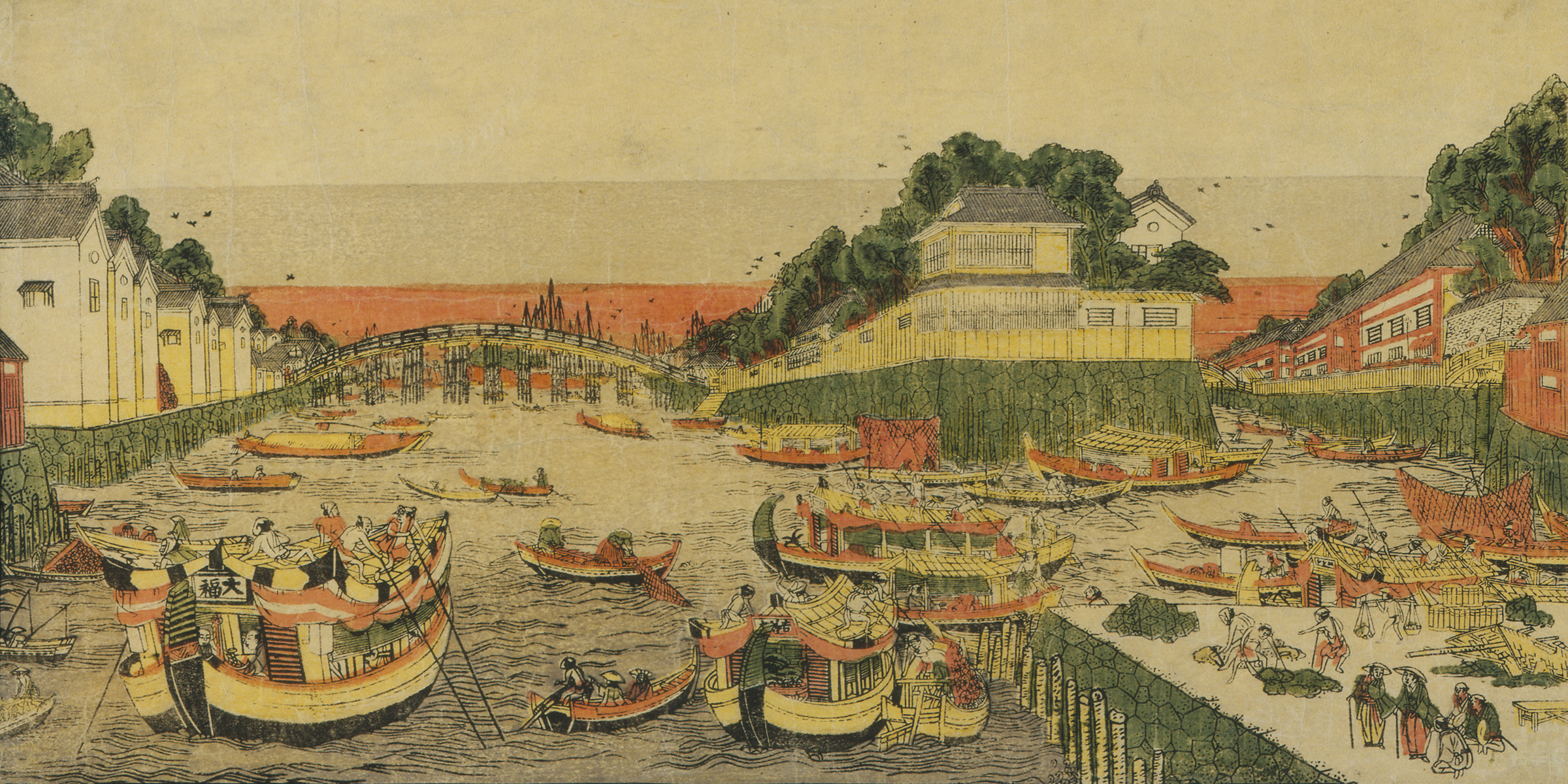
Boats on a River, Being Loaded and Unloaded, by Toyoharu, eighteenth century. © Newark Museum / Art Resource, NY.
Toward the end of an evening, the captain liked to review the story of his life, and through the drift of cigar smoke it wasn’t hard to hear variations on a theme by Joseph Conrad. Born in 1882 in Norway, Rieber had gone to sea at age fifteen as deckhand on a six-month voyage from Europe around Cape Horn to San Francisco aboard the full-rigged clipper ship Hiawatha. A year later he was quartermaster of a three-masted barkentine carrying slave labor from Calcutta to the sugar plantations in the British West Indies. Rising in the ranks of the Texas Oil Company from ship captain in 1905 to chief executive in the 1930s, he acquired a concession to oil rights in Colombia for $14.5 million, supervised the building of a 263-mile pipeline from the refineries of Tibú and La Petrólea to the port at Coveñas. The pipeline crossed the Andes at an altitude of 5,284 feet through the Captain Rieber Pass.
Recalling problems encountered in Colombia, Rieber paused to consider a question of economic policy. “It’s always better to deal with dictators than with democrats. A dictator you have to bribe only once; democrats you have to keep bribing over and over again.” In Conrad’s imaginary republic of Costaguana, a silver mine is the source of wealth. The banker Holroyd supplies the capital to develop it on condition the local government stays bought. What is wanted is order and security, no daydreaming with unreal objectives such as democratization and human rights. To the businessman operating the mine Holroyd says, “You go ahead in your own way, and I shall know how to help you as long as you hold your own. But you may rest assured that in a given case, we shall know how to drop you in time.” The businessmen conducting America’s foreign affairs throughout the twentieth century adopted Holroyd’s approach to the funding and defunding of dictators in Guatemala, Vietnam, Saudi Arabia, Iran, Panama, and Iraq. America’s commercial empire embodied the attempt to buy the future instead of making it.
Rieber delighted in his resemblance to the driving force of a machine. Conrad despaired of the capitalist dynamic as a mechanical loom, saying of it in a letter to a friend, “It knits us in and it knits us out. It has knitted time, space, pain, death, corruption, despair, and all the illusions—and nothing matters.” one can’t interfere with it; “you can’t even smash it.” You can just “stand appalled” and watch the cogs and wheels continue their “remorseless process.”
Nostromo appeared in London in 1904, the same year that the German sociologist Max Weber writes The Protestant Ethic and finds that the “new spirit…of modern capitalism” disrupts the comfortable and leisurely ways of doing business—“traditional rate of profit, the traditional amount of work, the traditional manner of regulating the relationships with labor.” Earnings were moderate; so were business hours, “perhaps five to six a day, sometimes considerably less.”
The new principle of low cost and large turnover downgrades both the quality of life and the quality of product. The tradesman looks to sell the price of a thing as opposed to the worth of a thing. Under the pressure of bitter competitive struggle, moneymaking becomes a full-time occupation, an end in itself to which people are bound as a calling, “contrary to the ethical feelings of whole epochs.” Attempts on the part of religion and philosophy to influence economic life are seen “as much an unjustified interference as its regulation by the state.”
Up and running at always accelerating speeds over the past 140 years, the remorseless process of dehumanized moneymaking is the globalized economy believed these days to possess the power of divinity. The $73 trillion trading on the world’s computer screens is human energy and desire concentrated as lifeless abstraction, moving at the speed of light in a moral and intellectual vacuum, praying like Aristotle’s “Midas in the fable” for a miracle.
But money in and of itself cannot run the world. Not, God forbid, through any fault of its own but because, sad to say and more’s the pity, money in and of itself is mindless, no more capable of making a fair exchange of value than a dog snatching a bone from another dog.
Which maybe is why the word globalization excites a strongly negative response in the opinion polls asking Americans what they think of our current trade war with China, sanctions on Russia and Iran, or trouble with any other country objecting to America giving the word for everything between the North and South Poles.
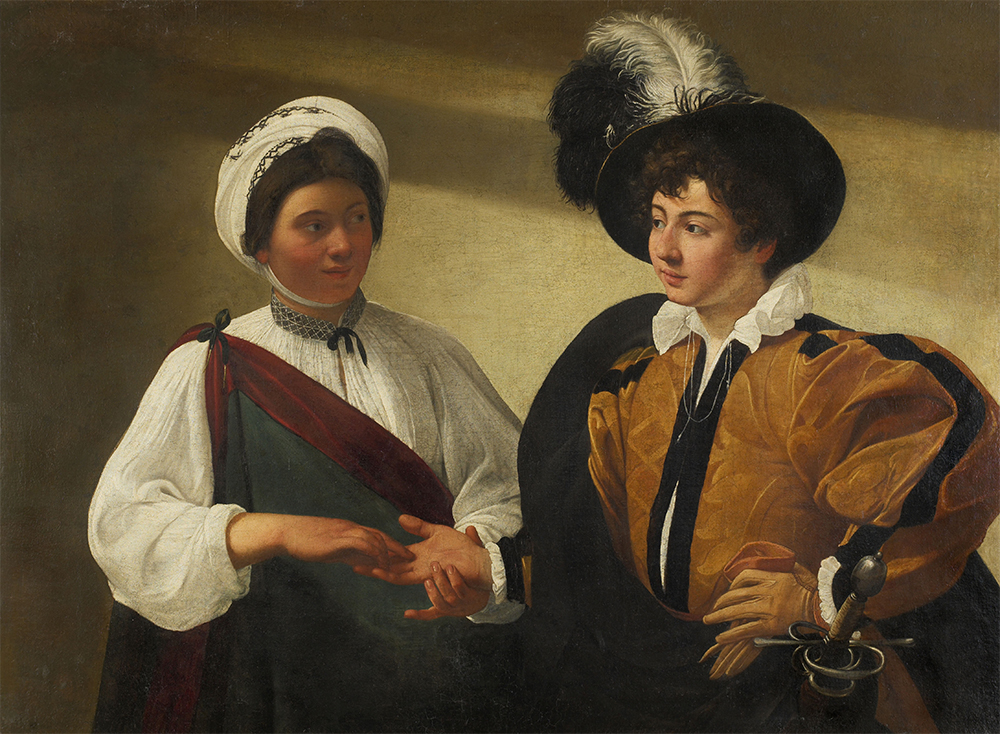
The Fortune Teller, by Caravaggio, c. 1595. © Musée du Louvre, Dist. RMN-Grand Palais / Art Resource, NY.
The response worries the material interests and moneyed elites responsible for the voice of Foreign Affairs, and so the winter 2019 issue appoints Alan S. Blinder, professor of economics and public affairs at Princeton University, to explain how the great and glorious capitalist dynamic might be misperceived by the common man, why public beliefs about international trade “differ enormously from the lessons of Economics 101.” His article, “The Free-Trade Paradox: The Bad Politics of a Good Idea,” is an inadvertent tour de force because he manages to show that free trade is a bad idea (as naked and shameless as Marx and Engels said it was) sorely in need of good politics to prevent it from destroying the planet.
I don’t know whether this is the truth Blinder intends to tell, but he does so by pointing out that the worldview of economists “differs dramatically from the worldview of most people.” Economists see the economic system, contrary to nature, set up to benefit the consumer of goods, not the producer of goods. Work is not an end in itself, not a direct source of satisfaction or self-worth. Work is something people dislike and do only to support their consumption.
“But what,” asks Blinder, “if economists have this wrong? What if people care as much (or more) about their role as producers—their jobs—as they do about the goods and services they consume?…If so, the standard case for free trade evaporates,” which would mean that “economists have been barking up the wrong tree for more than two centuries.”
A ridiculous thought, of course, and not one that Blinder cares to dignify with a rebuttal. He makes a little academic joke to startle his fellow officers on the bridge deck of Leviathan with the prospect of their being swept away in a dangerously rising tide of protectionist sentiment (both Trumpist and leftist) that “seems to dominate public opinion.” Free trade these days is a “tough sell” to an awful lot of people “being hurt by economic changes beyond their control,” and they’re losing faith in the god in the capitalist machine. They take no comfort in the great, good news preached in Princeton’s Economics 101, that the wealth of nations comes and goes at the whim of a free-swinging wrecking ball.
Neither do the agents and enablers of America’s plutocratic status quo, which is why in the winter issue of Foreign Affairs they go to the trouble of explaining that it is not they who swing the wrecking ball but the wrecking ball that swings them. They’re only along for the ride.
Related Reads
'重要資料 모음' 카테고리의 다른 글
| 가열되는 유시민-심재철 진술서 공방, 90쪽 분량 유시민 진술서 살펴보니 (0) | 2019.05.07 |
|---|---|
| The hunt for the Führer - How Hugh Trevor-Roper unraveled the mystery of Hitler’s death (0) | 2019.04.01 |
| 시인 이육사의 새로운 사진 2장 첫 공개 (0) | 2019.02.27 |
| ‘Republic of Korea’ 사용한 최초의 공식 외교문서 찾았다 (0) | 2019.02.27 |
| 고려인 최초 정착지, 눈덮인 들판 '우슈토베'를 가다 (0) | 2019.02.27 |
